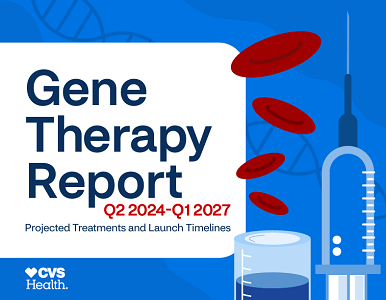Minimizing the financial impact of breakthrough therapies
Gene therapy cost management strategies
Michelle Gourdine, MD, Senior Vice President and Chief Medical Officer

Projected Treatments and Approval Timelines
Gene Therapy Pipeline | Q2 2024 – Q1 2027

Gene and genetically modified cellular therapies have the potential to cure disorders that once were incurable. Their remarkably high price, however, can be a lot to absorb, even if they have the potential to offset future health care costs.
$4M+ cost of a single gene therapy treatment1
$20B+ U.S. projected annual spending on gene therapies2
Our comprehensive approach to supporting plan sponsors in offering coverage for these extraordinary therapies integrates the following strategies.
1. Proactively monitor the pipeline.
The pipeline of gene and genetically modified cellular therapies is robust and growing, as technological advances enable new techniques and broaden the range of conditions these therapies may treat.
~29 new gene therapy approvals are expected by end of 20263
We leverage clinical and market expertise in our ongoing surveillance of the pipeline to help plan sponsors anticipate and prepare for new therapies. CVS Health even offers a customizable prevalence-based tool to estimate the potential for incurring gene therapy claims based on the size of the plan membership in any single year.
2. Help ensure clinically appropriate use.
It’s critical to have a framework in place to appropriately manage coverage of these complex and costly therapies. Such a framework should include:
- Consistent utilization management (UM) processes and tools aligned with evidence-based standards of care
- Clinical resources that can provide care coordination to support patients and caregivers
- Help for patients with navigating benefits and provider networks
CVS Caremark’s Specialty Guideline Management (SGM) program and Aetna’s Gene-based, Cellular, and other Innovative Therapy (GCIT®) program use dedicated management capabilities to support medically appropriate, safe, and cost-effective utilization.
3. Guide patients to high-value sites of care.
Gene therapies are highly specialized. Their administration may require complex and expensive medical care. Programs that include high-value networks and specialty pharmacy dispensing capabilities as part of the medical benefit plan support the patient journey and clinical quality, while also helping to control cost of care.
4. Smooth actuarial risk with gene therapy stop-loss protection.
Payors have different needs and risk tolerances. Our Gene Therapy Stop-Loss solution offers a robust and flexible insurance product with two options focused on one-time infusion gene therapies, to help reduce the financial risk of these expensive therapies. Payors have the option to cover just those products that are FDA-approved at the start of the stop-loss policy year, or to also include new therapies that gain approval during the policy year.
Both options have other standard features that enhance the financial risk protection, including:
- No exclusions or limitations on the amount covered for each member for FDA-approved or pipeline gene therapy drugs above the individual stop-loss limit
- The exclusion of the cost of a gene therapy claim from future renewal calculations
In addition, there are other potentially complementary approaches health plans and employers can use to reduce the cost impact of gene therapies, including extending centers of excellence models such as Aetna’s Gene-Based, Cellular and Other Innovative Therapies (GCIT) Designated Network program, value-based contracting, and an evolution of the role of CVS Specialty to encourage direct dispensing of gene therapies to reduce costs.
Making sure gene therapy-based treatments are accessible for all those who need them requires innovative partnerships, as well as new ways of providing health insurance and pharmacy benefit design.
-
-
2 Based on clinical trials that were underway before January 2020. https://pubmed.ncbi.nlm.nih.gov/37935855/
-
3 CVS Health Pipeline Services 2024. Pipeline Services projections, data Q2 2024 through May 1, 2024. New drug count includes new molecular entities, new biologics, biosimilars, new combinations, new formulations, CAR-T and non–CAR-T projections by Pipeline Services.